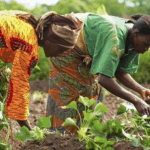
The Peasant Farmers Association of Ghana (PFAG) has issued a sobering analysis of the 2026 Budget Statement and Economic Policy, applauding the government’s expressed intention to support the agricultural sector but ultimately concluding that the financial commitment is grossly inadequate for achieving the structural transformation the nation needs.
Titled “Resetting for Growth, Jobs and Economic Transformation” and presented by the Minister of Finance, Dr. Cassiel Ato Forson, the 2026 budget is seen by the PFAG as a marginal improvement over past fiscal policies, yet it critically fails to bridge the gap toward food security and rural prosperity.
The Maputo Protocol Deficiency: A 7.82% Gap
The most striking point of contention is the budget’s expenditure allocation to the agricultural sector. The PFAG’s assessment reveals that only 2.18 percent of total government expenditure has been earmarked for agriculture.
This figure stands in stark contrast to the internationally recognized Maputo Declaration target, which mandates a minimum of 10 percent of the national budget be dedicated to agriculture. The 7.82 percentage point shortfall, according to the PFAG, means the government is providing insufficient funding to tackle major systemic issues, including:
- Recurring market gluts and post-harvest losses.
- Escalating vulnerability to climate-related shocks.
- The persistence of Ghana’s crippling US$3 billion annual food import bill.
Economic Context: Agriculture’s Positive Trajectory in 2025
The PFAG’s analysis acknowledges that the agricultural sector has been a key driver of positive macroeconomic indicators in 2025.
Data shows that the sector contributed significantly to a 6.3 percent GDP growth rate recorded in the first half of the year. Moreover, favorable weather conditions and successful interventions under the Feed Ghana Programme helped drive food inflation down sharply from 27.8 percent in January to 9.5 percent in October.
Sub-sector growth was robust:
- Crops expanded by 6.2 percent.
- Livestock grew by 5.8 percent.
- Fishing saw an expansion of 7.7 percent.
Despite this recovery, the Cocoa sub-sector—while showing a modest rebound from severe 2024 declines—remains vulnerable to climate change, illegal mining, and pests, a situation PFAG warns requires urgent government action to avert deeper crises.
Detailed Budgetary Interventions and Implementation Gaps
The 2026 budget outlines several ambitious initiatives, but the PFAG raises concerns over funding consistency and speed of execution:
| Intervention Area | 2026 Budget Allocation | PFAG Concern / Critique |
| Agricultural Enclave Roads | GH¢828 million for 1,000 km | Requires rigorous oversight for timely completion. |
| Farmer Service Centres | GH¢690 million to begin operationalization | Delays in establishment remain a major hurdle. |
| National Food Buffer Stock (NAFCO) | GH¢200 million to mop up excess produce | Questions raised over the slow pace of NAFCO operations and inconsistency in reported allocation figures. |
| Irrigation Projects | GH¢105 million for expansion under the “Irrigation for Wealth Creation Initiative” | Allocation is limited, and the budget lacks funding for new major irrigation facilities. |
| Oil Palm Development | US$500 million Oil Palm Development Finance Window | Focuses on one value chain, but other priority areas require attention. |
The government also committed to promoting all-year vegetable production and supporting agro-industrial value chains.
Critical Policy Omissions
The PFAG had previously submitted proposals calling for wide-ranging policy actions, including waiving taxes on agricultural inputs (which could potentially reduce production costs by up to 20 per cent), but several key demands were unmet in the final budget document:
- Absence of an Agricultural Development Fund: The budget failed to establish a dedicated fund to cushion farmers against unpredictable market and climatic shocks.
- Stalled Pastoral Development: There was a noted lack of investment in pastoral development and stalled cattle ranching and transhumance initiatives.
- Limited District-Level Financing: Agricultural financing from the District Assemblies Common Fund remains limited.
- Unaddressed Tax Waivers: Despite the clear potential to reduce production costs, the budget provided no new progress or timelines on tax waivers for agricultural inputs.
The PFAG is now calling for a stronger commitment to legal backing for local food procurement in schools and public institutions, clear timelines for the execution of major projects, and the establishment of robust accountability mechanisms.
The association asserts that only an ambitious investment and consistent implementation can set Ghana on the path to true agricultural transformation and inclusive economic growth.




